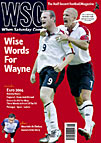 Daunis Auers was among the Latvia fans following their team of outsiders around Portugal. They might have even stayed a little longer but for a crucial decision by an English referee…
Daunis Auers was among the Latvia fans following their team of outsiders around Portugal. They might have even stayed a little longer but for a crucial decision by an English referee…
Euro 2004 arrived suddenly and unexpectedly in Latvia. About two weeks before the tournament, the local media began running stories on the national team. They followed the training regime of the players, reported on their choice of cars (Simon Jordan will be pained to hear that the two ex-Crystal Palace players had the nicest ones) and even ran features on the players’ wives.
But there was also plenty of evidence of Latvia’s inexperience in a major football tournament. The first set of kits produced by Adidas were in a distinctly unacceptable shade of Soviet red rather than the maroon of the Latvian flag. When the replacements arrived a few weeks later a number of players’ named had been misspelled. Moreover, the Latvian football federation had failed to order any replica shirts for the fans to buy. While some shirts did appear at the last minute, there were not nearly enough to cover demand.
The first game came against the Czech Republic was played in a Legoland stadium on the outskirts of Aveiro that appeared to have been finished at about the same tempo as the Olympic Stadium in Rome – there was much trampling over mud and grass to reach it. The game itself passed in a non-alcoholic blur (thanks to UEFA only sanctioning the sale of non-alcoholic beer in the stadium – something that was only pointed out to me after my third “pint”). The players were a revelation – Andrejs Prohorenkovs, a plodding Emile Heskey-like figure who puzzlingly kept Marians Pahars out of the starting XI, made his one significant contribution in three matches, sending in a fizzing cross put away by pimply faced Maris Verpakovskis. Incredibly, the move was set up by an incisive pass from Igors Stepanovs, who produced the type of performance that had tempted Arsène to buy him. While Latvia ultimately lost, the team performance was such that even in injury time the Latvian fans were chanting Uzvaresim (we will win).
The second game against Germany had been unsurprisingly shunted off to the rough and ready Bessa stadium, home of Boavista, rather than the more sumptuous home of FC Porto. The German fans were friendly, albeit patronising and supremely confident. For once, the Latvian end was mostly full, although this was due to the football association cashing in on the demand for tickets and selling its leftovers to any takers. As a result the Latvian end filled up with English, Swedish and Danish as well as German fans. However, a small group of aggressive middle-aged Englishmen from Corby (who claimed to have Latvian fathers) scared away most of the German fans just a few minutes into the game.
Latvia played their best game of the tournament, solid in defence, sparkling on the counter-attack. Only the saves of Oliver Kahn (who has a Latvian grandmother and became the only opposing player to be heartily booed by the Latvia fans) and the refereeing of Mike Riley denied us a victory. At the end the players celebrated as though they had won. Indeed, manager Aleksandrs Starkovs kept calling the result a “win” in the post-game press conference.
By the time of the final group game the Latvian prime minister had offered to dye his hair green if the team qualified for the quarter-finals (although this was a pretty modest offer compared to his saucy semi-nude appearance in a magazine last year). Coincidentally, June 23, the date of the Holland game, is the biggest celebration of the year in Latvia – midsummer – when Latvians head to the countryside to build bonfires, eat sausages and drink copious amounts of beer. Keeping with this theme, the front page of Latvia’s leading daily was adorned by golden boy Verpakovskis and his FHM covergirl fiancée posing, in traditional midsummer style, in a bush.
The Dutch fans were also much confused by the presence of Latvians with oak leaf crowns on their heads. In the game, the lethargic Latvia players looked as though they might have begun their own midsummer celebrations a bit early. Having already achieved their objective – a goal and a point – they seemed happy to just be on the same field as Davids, Seedorf, Van Nistelrooy and co.
Nevertheless the team returned home with their heads held high. While the data shows that Latvia conceded the most free-kicks and Kolinko made the most saves, this is not what it felt like. Latvia competed on the big stage – Stepanovs tugging back Van Nistelrooy, Vitalijs Astafjevs coming in late on Pavel Nedved, Verpakovskis scaring the life out of Kahn – and football dominated the front pages in a way that even ice-hockey never has.
Can the momentum be kept up? Can Latvia, a country of 100 professional footballers, with the oldest team at Euro 2004, really qualify for the next World Cup? Probably not, but roll on September when Portugal play their qualifying game in Riga. After all, if the Greeks can beat them, why not the Latvians?
From WSC 210 August 2004. What was happening this month